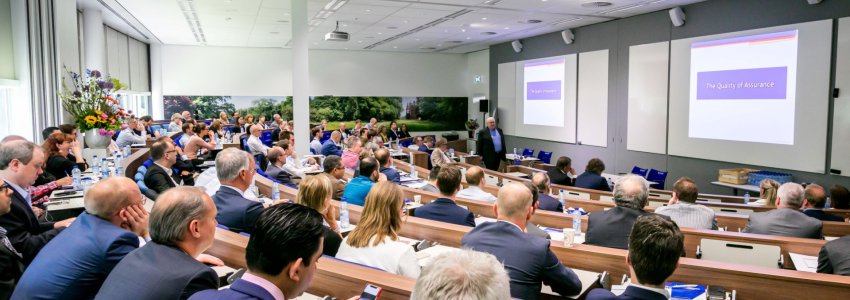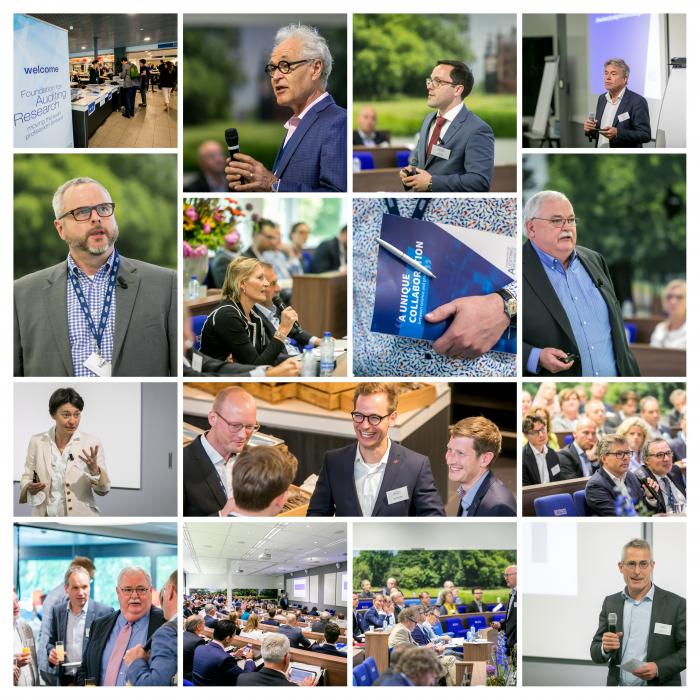4th International FAR Conference: The "human factor" plays a key role in audit quality
21 June 2019

The "human factor" plays a key role in audit quality
Breukelen, 14 June 2019 - The "ecosystem" of the entire financial reporting and assurance supply chain, in which an auditor has a role, largely determines the quality of the audit. The "human factor" plays a key role in this, according to the various studies presented at the 4th conference of the Foundation for Auditing Research (FAR) on 3 and 4 June. In the 5th research year of the FAR, the research results will be expanded further, with the aim of unlocking the "black box" of the drivers of audit quality and evidence-inform the professional development.
The FAR annual report 2018 was also presented during the conference. Among other things, the annual report provides an overview of current research and looks ahead to the presentation of research data from the studies that started in 2016 and will be completed this year.
The FAR recently obtained an ISAE3000 "type A" service organization report for their research data handling services as of April 26, 2019. This confirms that the FAR affiliated audit firms can share (anonymized / transformed) confidential data with FAR researchers and can rely on the existing FAR-CentERdata processes for the confidentiality of their data.This will help in the coming period to gain more research results into the factors that determine audit quality.
From science to policymaking
The conference was organized around the theme "Evidence Informed Policy Making for the Future of the Auditing Profession" - utilizing scientific insights to develop auditing standards and policies and thus further improving audit quality. Academics and practitioners internationally from different perspectives presented and discussed their insights. The common thread during the conference was the behavior, judgment and decision-making of the auditing practitioner. The presentations and subsequent discussions contributed to the FAR research agenda. FAR research focuses on evidence-based investigation into the underlying factors of audit quality.
The human factor
Research by Mark Peecher from the University of Illinois, which started last year, showed that the auditor's confidence in his client influences judgment. This form of bias can be prevented by alerting the auditor to the possibility that management may experience cognitive dissonance. By keeping this psychological effect in mind and focusing on objectivity and neutrality, the auditor's judgment can improve.
The assessment of the role of experts in the auditing process by the auditor also appears to be influenced by psychological effects, concluded Justin Leiby - also from the University of Illinois. High social status of experts can result in auditors considering them to be more competent in their judgment, confusing status with actual expertise of the specialist.

Prof. dr. Olof Bik, managing director of the FAR: “Many of the results presented at the conference were about the behavior, judgment and decision-making of auditors. At the end of the day an audit is conducted by humans, and that is why risks can never be ruled out completely. In the event of problems, emphasis must be placed on improving the behavioral component and organizational conditions with the audit firms. We look forward to the results and insights of a number of other studies on this topic.”
Focus on Processes
Keynote speaker Miguel Minutti-Meza from the University of Miami stated that too little is known about the auditing processes to gain insight into quality problems. He suggested that the profession could learn from the aviation industry, with the focus in the event of an accident on the processes in and around the aircraft, rather than on industry knowledge, market share or aircraft construction expertise. Minutti-Meza argued for a deeper understanding of the systems and processes surrounding auditing and a systematic approach to identifying and implementing points for improvement. The use of technology and artificial intelligence to discover meaningful patterns, as well as how the internal financial compensation and internal and external checks and balances are organized, should make it easier to identify deficiencies in the audit.
In conclusion, the second keynote speaker Robert Knechel from the University of Florida and FAR academic board member, raised two dilemmas. First, he stated that the more the auditing profession is standardized, the more the professional authority and effectiveness of professional judgment is undermined. This could result in auditors not being able to give a substantiated opinion on a financial report as rigorous as we might want. The second dilemma concerned the collaboration between client and auditor in their endeavor to be as complete as possible in the gathering of information. This cooperation could negatively influence the independence of the auditor. In contrast, independence regulation requires greater distance between auditee and auditor, and more distance in turn means less visibility. A proper balance between "un-informed independence" and "conflicted expertise " will therefore still have to be found in achieving optimal audit quality.
About the Foundation for Auditing Research
The Dutch Foundation for Auditing Research (FAR) was founded in 2015 based on the vision that the audit profession is subject to changing expectations and requirements. FAR focuses on the further development of knowledge about audit and assurance quality and the continuous improvement of the audit practice through scientific research, international collaboration with other research institutes, and by sharing research results through conferences and master classes. FAR links the audit science and practice by means of collaboration. This strengthens the learning curve of the audit profession and its stakeholders, feeds audit education, and offers support to the research community in the field of auditing, both within the Netherlands and abroad.
The FAR has accounted for the year 2018 in its Annual Report, which you can download via this link.
